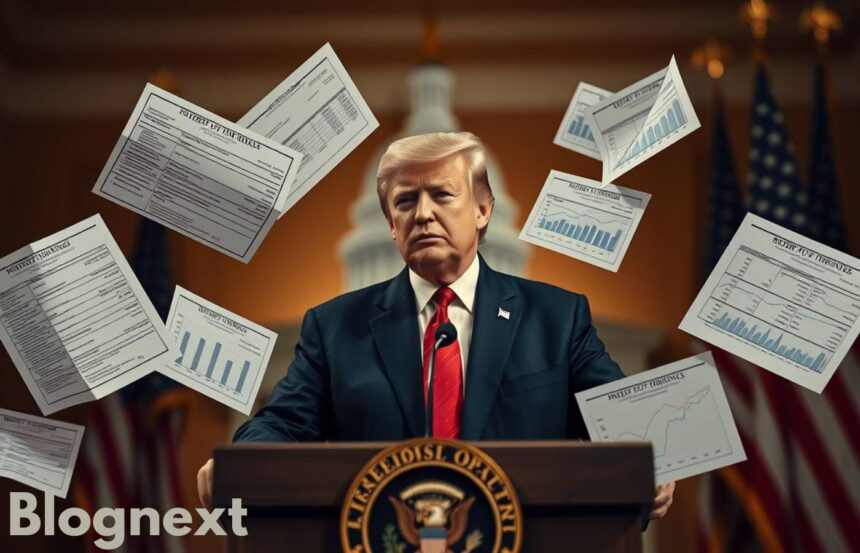Trump Income Tax History: Key Facts, Timeline, and Financial Background
The Trump income tax story remains one of the most significant political and legal debates in modern U.S. history. It’s not just about numbers on a tax form — it’s about presidential transparency, financial accountability, and public trust.
Donald Trump’s decision to withhold his tax returns during the 2016 campaign sparked a nationwide conversation. This controversy evolved into a years-long battle involving IRS audits, Supreme Court rulings, and New York state investigations.
As of 2025, court cases and legislative debates continue, ensuring the issue stays in headlines. This article answers the key questions about Trump’s tax history, legal challenges, and the broader implications for U.S. politics — all backed by credible sources and written for easy understanding.
What Is the History of Trump’s Income Tax Records?
Donald Trump’s tax history spans decades, influenced by real estate investments, licensing deals, and media ventures. Even before politics, his tax strategies — often involving depreciation, business deductions, and corporate structures — drew attention.
During the 2016 election, Trump broke tradition by refusing to release his returns, citing ongoing IRS audits. Critics argued this wasn’t a legal barrier; supporters defended it as a privacy right.
The IRS audit process became a focal point, with speculation about whether Trump’s reported losses significantly reduced his tax liability. These questions, left unanswered by the lack of disclosure, fueled the political firestorm that still burns today.

Why Didn’t Trump Release His Tax Returns in 2016?

Why Didn’t Trump Release His Tax Returns in 2016?
Trump claimed that IRS audits prevented disclosure. Legally, audits do not prohibit releasing tax returns — the choice was voluntary.
This refusal was unprecedented for a modern presidential candidate. It prompted investigative reporting, congressional scrutiny, and public speculation about income sources, tax rates, and possible conflicts of interest.
By keeping his returns private, Trump set a new precedent — one that continues to influence debates over whether financial transparency should be legally required for presidential candidates.
 What Did IRS Audits Reveal About Trump’s Finances?
What Did IRS Audits Reveal About Trump’s Finances?
The IRS has not released final audit findings on Trump income tax filings. However, reports indicate disputes over multi-year loss claims, large deductions, and complex real estate write-offs.
Auditing wealthy individuals is standard, but the stakes are higher for a sitting president. Congress argued that oversight of presidential tax filings is a matter of national interest, pushing for access to Trump’s returns.
While some details emerged through leaks and investigative journalism, the full IRS conclusions remain confidential — leaving the controversy unresolved.
What Legal Battles Have Shaped the Trump Income Tax Dispute?
Trump’s refusal to release tax returns led to multiple legal showdowns involving Congress, the New York Attorney General, and federal prosecutors.
Key legal questions included whether lawmakers had the authority to demand the returns and whether prosecutors could subpoena them. The disputes reached the Supreme Court, which ruled that presidents are not above the law but set procedural limits on congressional access.
These rulings created a blueprint for future presidential tax disclosure battles, balancing privacy rights with accountability.
 Trump Income Tax Strategies and Use of U.S. Tax Laws
Trump Income Tax Strategies and Use of U.S. Tax Laws
Donald Trump’s income tax history is closely tied to how he leveraged U.S. tax laws to minimize liability. Over decades, Trump utilized strategies common in real estate and corporate finance — including accelerated depreciation, like-kind exchanges, and strategic loss carryforwards — to legally reduce taxable income.
Large reported business losses from hotels, casinos, and real estate projects allowed him to offset future profits, significantly lowering his annual tax burden. Corporate structures, often involving multiple LLCs, gave him flexibility in shifting income and deductions between entities.
Critics argue these methods highlight loopholes in the tax code that benefit the ultra-wealthy, while supporters see them as proof of smart financial management. Regardless of perspective, Trump’s use of deductions, write-offs, and timing of income recognition illustrates how U.S. tax policy can be navigated to preserve wealth.
What Role Did New York Investigations Play?
New York became a central legal arena due to its jurisdiction over Trump’s businesses. Investigators examined whether asset values were inflated for loans but undervalued for taxes — a potential form of tax fraud.
They also reviewed charitable contributions, debt arrangements, and property valuations. Civil penalties and ongoing criminal inquiries have kept the state at the forefront of the Trump income tax fight.
What Are the Main Controversies Around Trump’s Taxes?
The most debated issues include:
Reporting large business losses to reduce taxable income.
Strategic use of depreciation and deductions.
Refusal to follow transparency traditions.
Critics say these practices exploit legal loopholes; supporters call them smart business tactics. The divide reflects larger national debates over fairness in the U.S. tax system.
 Public Opinion and Media Coverage of the Trump Income Tax Debate
Public Opinion and Media Coverage of the Trump Income Tax Debate
The Trump income tax controversy has been as much a battle of narratives as it has been a legal dispute. Public opinion polls consistently showed a split along partisan lines — with Democrats pushing for full disclosure and Republicans often dismissing the demands as politically motivated.
Mainstream media outlets framed the story differently depending on their editorial leanings. Progressive networks emphasized fairness and transparency, highlighting how secrecy around tax returns breaks long-standing presidential norms. Conservative media often focused on the legality of Trump’s actions, framing him as a target of political attacks.
Social media amplified these divides, with hashtags like #ReleaseTheReturns and #FakeNewsTaxes trending at various stages of the debate. Viral content, memes, and opinion threads kept the controversy alive long after major developments, turning it into one of the most discussed political issues in recent U.S. history.
What’s New in the Trump Income Tax Story in 2025?
As of 2025:
Court cases are ongoing in both state and federal jurisdictions.
New tax laws increase reporting requirements for high-income individuals.
Trump’s legal team continues to frame the disputes as politically motivated.
With legal proceedings active and legislative changes underway, Trump income tax remains a top political and legal issue.
 How Has the Trump Tax Controversy Changed U.S. Politics?
How Has the Trump Tax Controversy Changed U.S. Politics?
The case has intensified calls for mandatory presidential tax disclosure. Lawmakers are considering bills that would require candidates to release returns before elections.
It has also deepened partisan divides over accountability, shaping how future campaigns handle financial transparency. In effect, Trump’s case has redefined the conversation around privacy and public right to know.
FAQ Section
Q1: Why is the Trump income tax issue significant?
It’s significant because it challenges norms of presidential transparency and raises legal questions about financial accountability for elected officials.
Q2: What legal precedent did the Supreme Court set?
The Court confirmed presidents aren’t above the law but added strict conditions for Congress to access personal tax records.
Q3: Has Trump been proven guilty of tax fraud?
No court has convicted Trump of tax fraud, though investigations continue in New York and at the federal level.
Q4: What’s the political impact of the controversy?
It has influenced voter trust, campaign strategies, and ongoing debates about tax fairness and public accountability.
Future of Presidential Tax Transparency After the Trump Case
The Trump income tax saga has reshaped how Americans think about presidential financial transparency. Lawmakers at both state and federal levels have introduced bills requiring presidential and vice-presidential candidates to release multiple years of tax returns before appearing on ballots.
In 2025, several proposals in Congress aim to make financial disclosure a legal requirement, not just a tradition. Some states are also considering their own laws to enforce transparency, regardless of federal action. Supporters believe this will restore public trust, while opponents warn it could deter qualified candidates who value privacy.
The ongoing investigations into Trump’s taxes are likely to influence the final form of these laws. If passed, they would create a new precedent for political accountability, ensuring that future candidates cannot withhold tax information without facing legal consequences or electoral challenges.
 Conclusion: The Ongoing Legacy of the Trump Income Tax Story
Conclusion: The Ongoing Legacy of the Trump Income Tax Story
The Trump income tax saga is more than a political talking point — it’s a defining case in the history of U.S. presidential accountability. It has shaped legal precedents, fueled public debate, and inspired proposed legislation on financial transparency.
Whether seen as a privacy right or a transparency obligation, the story’s influence on American politics is undeniable. With legal cases still active in 2025, its outcome could set the tone for how future leaders handle public disclosure of personal finances.



 What Did IRS Audits Reveal About Trump’s Finances?
What Did IRS Audits Reveal About Trump’s Finances? Trump Income Tax Strategies and Use of U.S. Tax Laws
Trump Income Tax Strategies and Use of U.S. Tax Laws Public Opinion and Media Coverage of the Trump Income Tax Debate
Public Opinion and Media Coverage of the Trump Income Tax Debate How Has the Trump Tax Controversy Changed U.S. Politics?
How Has the Trump Tax Controversy Changed U.S. Politics? Conclusion: The Ongoing Legacy of the Trump Income Tax Story
Conclusion: The Ongoing Legacy of the Trump Income Tax Story





